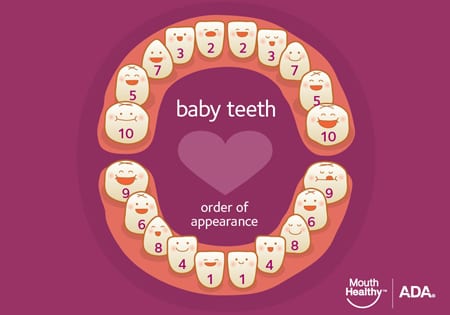For healthy teeth and gums, regular dental visits are essential—especially for children! Using proper brushing and flossing techniques at home is great, but nothing beats the thorough cleaning that only happens at the dentist’s office. Keeping your child’s mouth clean is important for their overall health.
So, if you’re getting ready to take your child in for a regular dental cleaning and exam, check out these common questions parents have for their child’s pediatric dentist.
For more detailed information, ask our team at Smiles Dentistry 4 Kids during your child’s appointment.
1. Why do baby teeth matter?
Even though baby teeth don’t last forever, they serve some pretty important purposes. Baby teeth help your child move from mushy baby food to solid foods that supports good nutrition. They help your child speak clearly and support their jawbone until the permanent teeth develop.
2. How often should my child visit the dentist?
According to the American Academy of Pediatric Dentistry, children should have their first dental visit as soon as their first tooth erupts and every six months after that. These visits will help track your child’s dental development, prevent tooth decay, and inform you about ways to best care for your child’s teeth.
By attending these regular dental appointments, you will be setting your child up for oral health success when he or she gets older!
3. Should I brush my baby’s teeth?
Absolutely! As soon as your baby’s first tooth erupts, you can use a soft-bristled, child-sized toothbrush and toothpaste to clean his or her tooth. Use toothpaste that is recommended by your pediatric dentist, follow the instructions, and make sure your child does not swallow excess toothpaste.
4. Will thumb-sucking hurt my baby’s dental development?
Before age three, thumb-sucking shouldn’t be a problem. However, it can become a problem if your child continues to suck on his or her thumb after their third birthday.
Talk to your dentist about the best ways to wean your child off thumb-sucking (or using a pacifier).
5. How much fluoride is safe for my child?
Fluoride can be found in most tap water sources and toothpaste. As long as these are your child’s only sources of fluoride, there shouldn’t be a problem.
In fact, as soon as your child’s first tooth erupts, you should use fluoride toothpaste (albeit, an amount the size of a grain of rice) to brush it.
Stay away from fluoridated mouthwash until your dentist recommends it or your child is more than six years old.
As long as you follow these guidelines (and recommendations from your dentist) your child shouldn’t experience any negative effects of fluoride. However, if you notice a change in the appearance ofyour child’s teeth, talk to your dentist or healthcare provider.
6. How do I keep my child from being afraid of the dentist?
The best thing you can do is talk about the dentist in a positive way. Many adults are afraid of the dentist and pass that fear on to their child. This can make pediatric dental appointments difficult for both of you.
You can also find books or tv shows about the character’s first dental appointment, promise your child a treat after the appointment, or tell him or her a positive story about a time you went to the dentist.
Hopefully, the pediatric dentist and dental team you’ve chosen also help make going to the dentist fun for your little one.
7. Are dental x-rays safe?
X-rays are one of the most important parts of the diagnosis process. To keep your child safe, and lower the risk of radiation exposure, your dentist will use protective gear, keep up with the latest technology, and follow American Dental Association guidelines.
These things make the risk of radiation exposure almost nonexistent. It is actually much riskier to leave a dental problem undetected than it is to have an x-ray.
8. Are dental sealants worth it?
Dental sealants are a thin coating that protects your child’s back teeth from cavities for up to four years. This will save you time and money in the long run. We’d say that’s worth it!
9. How is a pediatric dentist different from a family dentist?
Pediatric dentists are specially trained to treat and care for children from infancy to adolescence. Family dentists typically receive a more general education so that they can treat patients of all ages.
In addition, pediatric dentists design their offices specifically for children to feel comfortable. Their goal is to create a fun and educational environment that children enjoy coming to.
10. How can I help my child avoid baby bottle tooth decay?
Baby bottle tooth decay is the leading cause of tooth loss in infants. To protect your baby’s teeth, follow these guidelines:
- Clean your baby’s gums with a washcloth or gauze pad after feeding
- Make sure he or she is getting enough fluoride
- Brush the baby’s new teeth
- Schedule regular dental visits
Ready to meet with your pediatric dentist? Call today to schedule an appointment for your little one!
To meet with Dr. Matt at Smiles Dentistry 4 Kids, contact our friendly team today at 913-685-9990.

